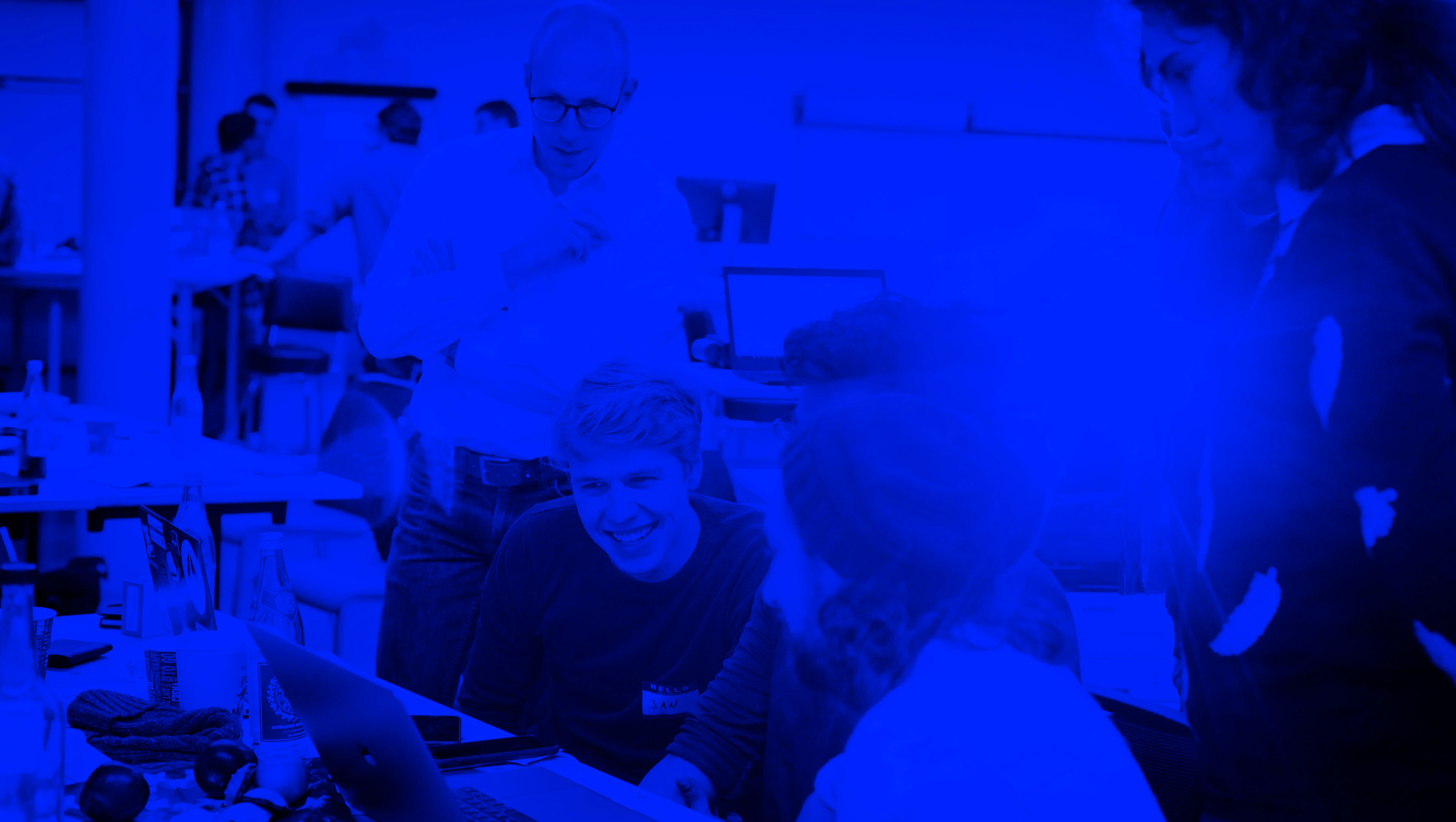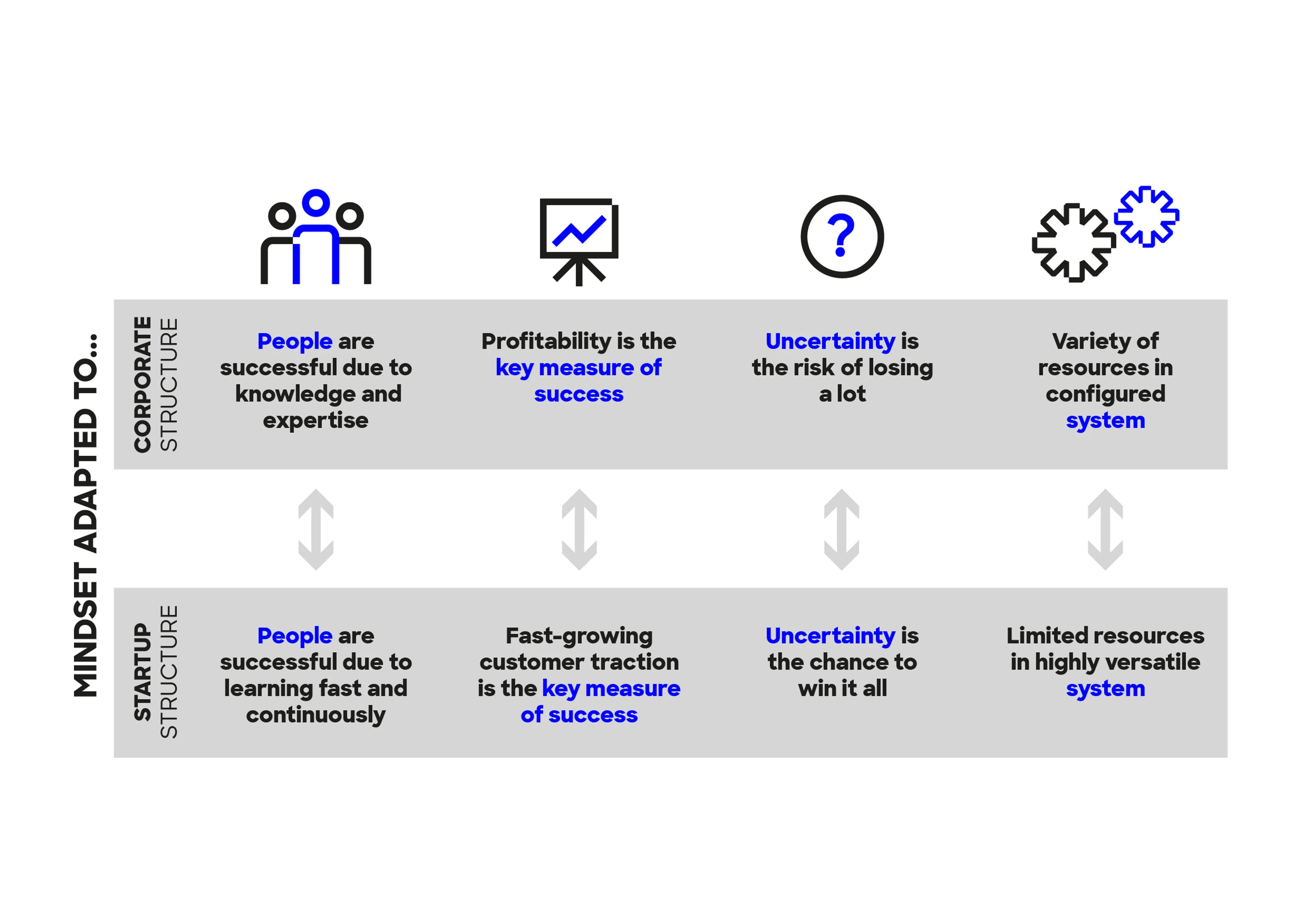
Looking at the topic of collaboration between established companies and start-ups from a human-centered perspective, our experts at UnternehmerTUM Business Creators have identified four mindset gaps between the typical mindset that is fostered by corporate organizational structures and the typical mindset that is fostered by start-up organizational structures. Read more about why these gaps make collaboration so challenging and learn about how to avoid them.
Collaboration between established companies and start-ups is difficult, and only few succeed in transitioning a pilot project into a sustainable, fruitful collaboration. There are of course many reasons why these collaborations fail so often, but we believe that a main success factor - like in so many areas in life – is awareness for the people involved and their individual perspectives. UnternehmerTUM Business Creators consultants have worked in and with many corporates and start-ups. Based on this experience, the mindsets cultivated in these organizations are fundamentally different regarding four key topics. Obviously, there is no black and white differentiation and one cannot guess the mindset of an individual based on their job title. However, you should closely observe the people involved, empathize for how they have adapted to their organizational surroundings and strive to understand and address their perspectives and true motivation.
When trying to establish collaboration between a start-up and a corporate, be aware of these mindsets and the attitude and actions they can evoke. Below are four examples of how they might manifest.
Four Mindset Gaps that Can Make Collaboration Challenging

1. People are Successful due to Knowledge and Expertise vs.
People are Successful due to Learning Fast and Continuously
Many managers in established companies have reached their position due to their knowledge and their talent for always having the right answers. Failing to have the right answers and thus making mistakes or wrong decisions can evoke negative consequences. Therefore, start-up projects, which are often uncertain and risky by nature, are not pursued as they invoke too many unanswered questions.
2. Profitability is the Key Measure of Success vs.
Fast-growing Customer Traction is the Key Measure of Success
Corporate decision-makers are encouraged and trained to always work towards profitability. Metrics that are used in many start-ups nowadays, like the number of customers, validated learning and revenue generated, do not fit this concept of “success”. Therefore, collaboration projects are often forced to present a solid business case early and – due to high volatility and uncertainty – rarely live up to these expectations before they get cancelled.
3. Uncertainty is the Risk of Losing a Lot vs.
Uncertainty is the Chance to Win It All
Established companies often plan their resources and projects far ahead to ensure stability and manage risks. Employees need to present a solid, long term project plan to convince their stakeholders of taking a certain risk (e.g. an investment). However, if the objective of a collaboration project with a start-up is to explore a new market or business model, a detailed (often static) long term plan is preprogrammed to fall short because there are little to no reference values. The responsible employee or team risks losing their credibility within the company.
4. Variety of Resources in a Configured System vs.
Limited Resources in a Highly Versatile System
A successful, established company is a bit like a swiss watch – there
are a myriad of pieces inside it that appear in abundance from the
outside, but each of them is tightly bound into a configured, running
system. So even though the corporate might have much more resources or
manpower for the collaboration project than the start-up, in theory, it
is challenging to carve them out or repurpose them. Moreover, if the
goals of the start-up collaboration project do not directly pay into an
employees’ individual objectives, they have even less incentive to spend
their limited time on it.
Bridging the Gaps
These examples illustrate how many typical hurdles of establishing a
collaboration between start-ups and corporates can root in the described
differences in (stakeholder) perspectives. Take the first step by
recognizing such a mindset gap as the cause and use it as a lever for
overcoming it. Here are some of our recommendations on how to reduce
said mindset gaps to establish successful and lasting collaborations.
Established Companies: Planning and Transparency
Above all: Make sure you and all relevant stakeholders have joint understanding of the motivation (why) and goal behind a specific collaboration
- Foster (moderated) networking between relevant stakeholders.
- Involve department or business unit stakeholders early and before details are pitched to upper management, take the necessary time for a gradual cultivation of mindset.
- Consider relevant company and department objectives already during setup and scouting to ensure easy fit.
- Gain top-level management support to enable the relevant department managers and stakeholders to re-prioritize if necessary.
- Setup and enable (e.g. train and coach) an agile project team with entrepreneurial responsibility. Implement regular reviews of process based on meaningful joint milestones instead of "old" established KPIs.
- Ensure funding until ROI with a central budget for start-up / innovation projects.
- Transform and adapt relevant KPIs and resource planning step-by-step with specific projects to test them.
- Communicate and market ongoing and successful projects actively.
Start-ups: Clear Communication
Above all, make sure to keep the networking between relevant stakeholders well alive.
- Maintain key points of contact within the established company that help you navigate processes.
- Strictly prioritize projects based on your long-term strategy and current timing and focus on selected collaboration projects.
- Provide relevant context information regarding the corporate partner to the whole team and enable networking with relevant stakeholders.
- Be transparent about your (delivery) timeline and time constraints and take into account that resource allocation and decision making during the collaboration project might take longer than you are used to.
- Review and iterate the collaboration and underlying assumptions regularly and address issues and risks early and openly.
- Negotiate specific milestones and project phases to avoid getting stuck in no charge pilot projects.
For you as a start-up member or corporate innovator, there are many
different options for how to customize these recommendations for their
specific context. However, we hope that looking at this topic from a
human-centered perspective helps you to gain a new point of view and
discover new approaches to challenges.
Let us know about your experiences with this topic and reach out if you want to get started with tackling the described challenges (contact below). If you’d like to learn more about UnternehmerTUM’s consultancy UnternehmerTUM Business Creators, head to the website.
Sigrid Ebbinghaus
Manager at UnternehmerTUM Business Creators
ebbinghaus@bneo.de
+49 89 189 469 2122
Sigrid has ten years of experience in agile, human centered innovation methods and has worked in the field of corporate innovation and startup collaboration for five years.
About UnternehmerTUM Business Creators:
UnternehmerTUM Business
Creators offers consulting for innovation and business creation to
corporates and SMEs in various industries. From co-designing an
innovation strategy to building a bridge to the startup world to company
building – the team provides support in bringing innovation
opportunities to life.






























